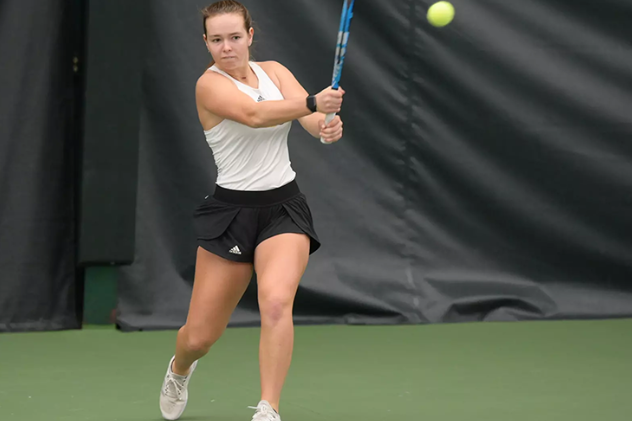UWM student athletes excel even when they’re not competing.
The UWM women’s tennis team recently received the Horizon League’s Raise Your Sights award for 2023-2024, an honor given to the top academic women’s and men’s teams based on combined grade point average for the academic year. The women’s tennis team led the league with a GPA of 3.857. (Green Bay men’s golf was the top men’s team with a 3.8 GPA.)
While the tennis team took top honors, athletes from other sports are also competitive academically. In the spring semester of 2024, 105 UWM student athletes posted a GPA of 3.8 or higher, according to Amanda Braun, UWM director of athletics.
Helping these athletes balance demanding sports competitions with academics is a team effort, involving coaches, advisors, campus resources and hard-working students.
Sara Simonova, a junior political science and international studies major from the Czech Republic, says that teammates are helpful with academics too. “We support each other, and UWM is so helpful.” (Milwaukee Athletics photo)
“We have a lot of leaders on our team, a really mature team,” said Mark Goldin, who took over as head women’s tennis coach this year. “What I can do as a coach is make clear what my priorities are for them.”
First is mental health, then schoolwork and community, and then tennis, he said. “There’s a reason they’re called student athletes, putting the student before the athlete. If you do your job as a coach of prioritizing the first three, you allow your students to maximize their abilities on the tennis court,” Goldin said.
UWM team coaches have “awesome resources” to help support student athletes, he added.
The Athletics Department has a team of three advisors who work with students and faculty to help them balance academics with athletic competitions.
“Our job is really to help our students be students while also being an athlete,” said Clare Faurote, associate athletic director of academic services.
David Cox, a soccer player now in graduate school, appreciates the academic support that athletes get. “When you’re in season, you don’t have lot of free time, especially if you’re on the road.” (Milwaukee Athletics photo)
“Our work with them really starts when they’re recruited,” she said. “When the coaches bring them to campus, we meet and discuss the academic side of things. Right now, we’re working with athletes who are starting this fall who are on campus for orientation.”
During the academic year, students meet weekly or bi-weekly with the advisors as well as with their major advisors.
“The transition from high school to college is challenging for any student so we have these freshman meetings to make a good foundation,” Faurote said. First year students also take a one-semester course, Educational Psychology 102, that teaches them time management and study skills. Advisors can also introduce them to tutoring and other campus academic support resources as needed.
Giorgia Cavestro, one of the tennis team members chose UWM because of the culture that focused on academics. “I knew the environment I was joining was that school comes first so I try to do my best in the classroom, as well as on the court, obviously,” said Cavestro, who came to UWM from Italy.
The tennis team members support each other. “All eight girls on the team have the same mindset, so that makes it easier for us,” she said. “We study together, we help each other when needed.”
Cavestro, a senior, is majoring in IT management and accounting and was honored as one of the Lubar 25. That is an annual program that recognizes 25 undergraduate students in the Lubar College of Business who stand out for their accomplishments in academics, entrepreneurship, leadership or campus/community service.
Nadiia Konieva says that UWM advisors help athletes balance their athletic and academic priorities. “It’s hard, especially if you have to travel and you have a class, but you can always talk to the professor and figure out how to do it,” she said. (Milwaukee Athletics photo)
“Clare does a really good job of helping us manage our schedules,” said David Cox, a soccer player now in graduate school. He majored in political science and English with a minor in communication. “When you’re in season, you don’t have lot of free time, especially if you’re on the road.”
Like all the athletes, he received a letter from the athletics advisors to share with his professors, letting them know of sports competitions and travel schedules. That helped make the process of balancing academics and sports easier. “I think the whole athletic academic staff does a really good job,” he added.
Good grades are important to her future career in psychology, said Nadiia Konieva, a junior who came to the team from Ukraine as a freshman. The advisors can help athletes organize their schedules around meets, work with faculty to make sure students arrange to complete exams and important papers.
“It’s hard, especially if you have to travel and you have a class, but you can always talk to the professor and figure out how to do it,” she said. “Some of it is self-motivation.”
“Mental toughness is part of being an athlete,” said Sara Simonova, a junior political science and international studies major from the Czech Republic, adding the support of her teammates and the university have helped her focus on her studies. “We support each other, and UWM is so helpful.”
Written by Kathy Quirk, Communications
